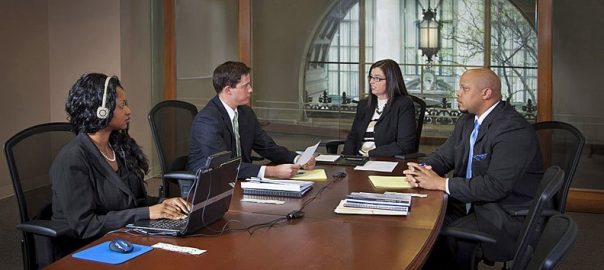Checking Out the Effectiveness of Performing Legal Depositions Remotely Via Virtual Systems

Advantages of Remote Depositions
Remote depositions provide substantial advantages, consisting of enhanced flexibility and performance in lawful proceedings. One of the primary advantages of performing depositions remotely is the convenience it gives to all parties entailed.
Moreover, remote depositions typically cause much shorter proceedings due to the structured nature of digital systems. With functions such as display sharing, electronic displays, and real-time transcription, the deposition process comes to be a lot more efficient and focused. Additionally, remote depositions provide boosted ease of access for individuals with disabilities, as online systems can suit various needs, such as shut captioning and screen reader compatibility.
Technology Tools for Digital Depositions
Structure on the performance and adaptability used by remote depositions, the use of sophisticated modern technology devices improves the efficiency of digital deposition processes. Virtual depositions profit substantially from the combination of numerous technology devices that improve communication, facilitate file sharing, and guarantee smooth process. Video conferencing systems like Zoom, Webex, and Microsoft Teams enable smooth real-time interaction between participants, replicating the face-to-face deposition experience. In addition, specialized deposition software application such as LiveLitigation and CaseLines offer functionalities for exhibit handling, annotation, and digital signatures, boosting and decreasing management worries company. Digital exhibition repositories, cloud storage space solutions, and protected file-sharing solutions offer convenient and safe approaches for keeping and exchanging deposition-related materials. Furthermore, transcription services integrated with AI technologies can supply exact real-time transcriptions, aiding in capturing essential information and helping with post-deposition evaluation. By leveraging these innovation devices, attorneys can carry out virtual depositions successfully, making sure a successful and effective process.
Best Practices for Remote Testimonies
Carrying out reliable techniques for maximizing the impact of remote testaments is necessary for making sure credibility and efficiency in legal proceedings. To achieve this, it is important to establish clear standards and finest methods for performing remote testimonies through online systems.

Firstly, it is essential to ensure that all participants are acquainted with the online platform being utilized for the testament. Supplying training sessions or tutorials in advance can aid witnesses and attorneys navigate the technology smoothly, decreasing interruptions throughout the real testament.
In addition, keeping a professional and well-prepared temperament is crucial for all events included (Remote Depositions). This includes clothing appropriately, making sure a quiet and neutral background, and performing the testimony in a well-lit setting to boost exposure
Moreover, establishing clear interaction methods, such as elevating hands to speak and silencing microphones when not speaking, can assist simplify the process and prevent unneeded disruptions.
Security Steps in Online Depositions
In the context of remote lawful procedures, keeping the honesty and privacy of information traded during digital depositions demands the execution of durable safety procedures. Online depositions present unique obstacles in making certain information security due to the virtual nature of the communications. One essential safety and security step is utilizing encrypted interaction networks to safeguard sensitive info shared during the deposition. It is imperative to validate the identity of all participants and limit access to only certified people to avoid unapproved disclosure of navigate to this site information. In addition, using secure digital platforms with multi-factor verification and end-to-end file encryption can enhance the total safety posture of the deposition procedure. On a regular basis updating protection procedures and conducting cybersecurity training for all included parties are crucial action in mitigating potential dangers connected with digital depositions. By focusing on protection actions, lawful professionals can infuse depend on in the online deposition process and support the privacy and stability of the legal process.
Overcoming Obstacles of Remote Depositions
How can attorneys successfully navigate and address the hurdles related to carrying out remote depositions? One of the primary difficulties of remote depositions is making certain the innovation works efficiently throughout the entire process. To overcome this, it is important for lawyers to perform thorough technology checks well ahead of the deposition and have backup plans in place in case of technological troubles. Remote Depositions. Furthermore, preserving a high level of communication with all parties entailed, consisting of the stenotype reporter, witnesses, and opposite advice, is important to resolve any type of problems immediately.
One more obstacle is ensuring the protection and privacy of the deposition proceedings. Attorneys need to select a secure digital platform with security capabilities to shield sensitive details. Executing rigorous access controls and firmly sharing files can better improve the security of remote depositions. In addition, offering clear guidelines to all participants pertaining to privacy protocols and expectations is essential to preserving the honesty of the deposition process. By proactively resolving these difficulties, lawyers can efficiently conduct remote depositions with performance and confidence.
Final Thought

In the fast-evolving landscape of lawful proceedings, the shift in the direction of conducting lawful depositions from another location with digital platforms has actually become a focal factor of conversation among lawful experts.Structure on the effectiveness and adaptability provided by remote depositions, the application of sophisticated technology devices enhances the efficiency of digital deposition procedures. Virtual depositions existing distinct obstacles in making sure data protection due to the virtual nature of the interactions. By prioritizing protection procedures, lawful experts can impart depend on in the digital deposition process and promote the discretion and honesty of the lawful procedures.
Despite challenges, the advantages of performing lawful depositions remotely through online systems make it a practical alternative for legal experts.